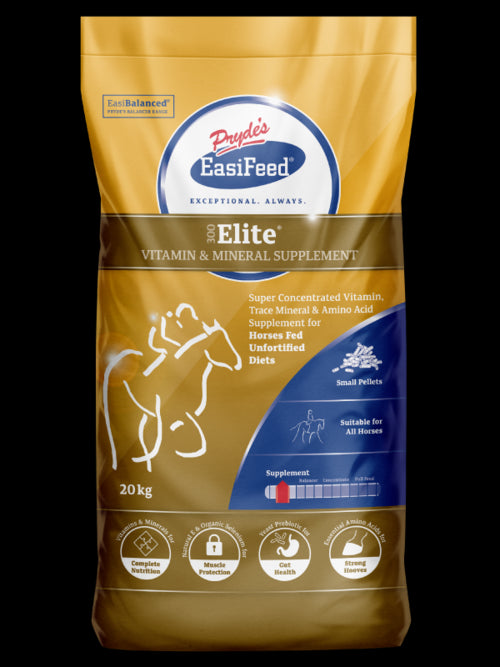PRYDES
PRYDES ELITE 300 PELLET 20KG
PRYDES ELITE 300 PELLET 20KG
Couldn't load pickup availability
Feeding Rates & Directions (g/day)
grams/100 kg of
Bodyweight per day
EXAMPLE: amount/day for
a 500 kg horse**
Not in Work
15
75
Light Work
20
100
Moderate Work
25
125
Heavy Work
30
150
Pregnant and Lactating Mares
25
125
Breeding Stallions
20
100
Weanlings, Yearlings and 2YOs**
25
125
Aged Horses (not in Work)
20
100
Laminitic Horses and Ponies
25
125
Horses and Ponies on Calorie Restricted Diets
20
100
**Use your horse's expected mature bodyweight to calculate the correct dose. For example a weanling that will mature at 500 kg should receive 5 x 25 g = 125 g/day.
Light Exercise: Up to 60 mins walking, or 30 mins walking, trotting and cantering.
Moderate Exercise: Up to 120 mins walking and trotting, or 30-60 mins trotting, cantering and some galloping.
Intense Exercise: 30-60 mins intense skill work, short duration galloping, racing and endurance.
For the Best Results
- Introduce into a horse’s ration gradually over 2 weeks.
- Feed in conjunction with ample forage (pasture, hay and/or chaff).
- Make clean, fresh water and salt available at all times.
- Adjust the amount fed so it is appropriate for a horse’s current activity and bodyweight.
- Divide feeds into two or more smaller meals if feeding more than 0.5 kg per 100 kg of bodyweight in ‘hard feed’ per day.
- The feeding rates given here are based on the amount of balancer pellet needed to meet a horse’s vitamin and mineral requirements. If you feed below these feeding rates, vitamin and mineral deficiencies will appear in the diet and may affect health and limit growth and sound development, reproduction or performance. It is best to feed this balancer pellet at the recommended amounts.
- If you are feeding this balancer pellet in conjunction with one of the Pryde’s EasiFeed range of complete feeds the amount fed may be reduced. See the ‘Keep It Balanced’ information on the back of your feed bag for adjusted feeding rates.
Did You Know?
A 500 kg horse has approximately 115,000,000,000,000 (115 trillion) bacteria living in its hindgut. These bacteria are responsible for digesting fibre and also produce large amounts of B-group vitamins including biotin. Keeping them healthy is essential for the overall health of a horse.
Share




